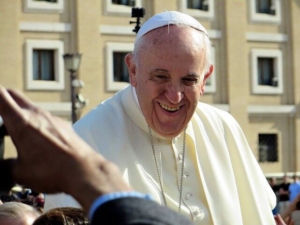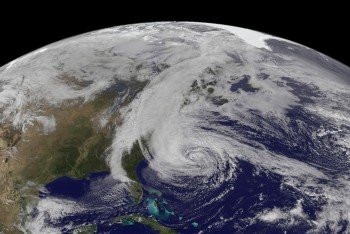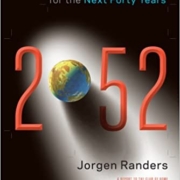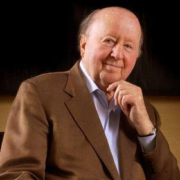Thoughts on Pope Francis’ Laudato Si
by Herman Daly
As a Protestant Christian, my devotion to the Catholic Church has been rather minimal, based largely on respect for early church history and for the love of an aunt who was a nun. In recent times, the Catholic Church’s opposition to birth control, plus the pedophile and cover-up scandals, further alienated me. Like many others, I first viewed Pope Francis as perhaps a breath of fresh air, but little more. After reading his encyclical on environment and justice, dare I hope that what I considered merely “fresh air” could actually be the wind of Pentecost filling the Church anew with the Spirit? Maybe. At a minimum, Pope Francis has given us a more truthful, informed, and courageous analysis of the environmental and moral crisis than have our secular political leaders.
True, the important question of population was conspicuous by its near absence. In an earlier offhand remark, however, Francis said that Catholics don’t need to breed “like rabbits” and pointed to the Church’s doctrine of responsible parenthood. Perhaps he will follow up on that in a future encyclical. In any case, most lay Catholics have for some time stopped listening to Popes on contraception. The popular attitude is expressed in a cartoon showing an Italian mamma wagging her finger at the Pontiff and saying, “you no playa da game; you no maka da rules.” Discussing population would not have changed realities and would have aroused official opposition and distracted attention from the major points of the encyclical. So I will follow Francis’ political example and put the population question aside, but with a reference to historian John T. Noonan, Jr.’s classic book, Contraception, which sorts out the history of doctrine on this issue.[1]
The big ideas of the encyclical are Creation care and justice, and the failure of our technocratic growth economy to provide either justice or care for Creation. Also discussed was the integration of science and religion as necessary, though different, avenues to truth. And yes, the Pope supports the scientific consensus on the reality of climate change, but, media monomania to the contrary, the encyclical is about far more than that.[2]

Pope Francis’ environmental encyclical “Laudato Si, On Care for our Common Home”, was released on June 18, 2015. (Image: CC0, Credit: gunthersimmermacher).
Francis’ voice is of course not the first to come from Christians in defense of Creation. In addition to his ancient namesake from Assisi, Francis also recognized Ecumenical Patriarch Bartholomew of the Eastern Orthodox Church, who has for two decades now been organizing conferences and speaking out in defense of rivers and oceans, including the Black Sea. The Orthodox Church lost a generation of believers to Communistic atheism but is gaining back many young people attracted to the theology of Creation and the actions it inspires. Liberal mainline Protestant Christians, and more recently, conservative Evangelicals, have also found their ecological conscience. So Francis’ encyclical would seem to be a capstone that unifies the main divisions of Christianity on at least the fundamental recognition that we have a shamefully neglected duty to care for the earth out of which we evolved, and to share the earth’s life support more equitably with each other, with the future, and with other creatures. Many atheists also agree, while claiming that their agreement owes nothing to Judeo-Christian tradition. That is historically questionable, but their support is welcome nonetheless.
This theology of Creation should not be confused with the evolution-denying, anti-science views of some Christian biblical literalists (confusingly called “Creationists” rather than “literalists”). Mankind’s duty to care for Creation, through which humans have evolved to reflect at least the faint image of their Creator, conflicts headlong with the current dominant idolatry of growthism and technological Gnosticism. The idea of duty to care for Creation also conflicts with the materialist determinism of neo-Darwinist fundamentalists who see “Creation” as the random result of multiplying infinitesimal probabilities by an infinite number of trials. The policy implication of determinism (even if stochastic) is that purposeful policy is illusory, both practically and morally. Creation care is also incompatible with the big lie that sharing Earth’s limited resources is unnecessary because economic growth will make us all rich. Francis calls this magical thinking. He skates fairly close to the idea of steady state economics, of qualitative development without quantitative growth in scale, although this concept is not specifically considered. Consider this paragraph:
In any event, if in some cases sustainable development were to involve new forms of growth, then in other cases, given the insatiable and irresponsible growth produced over many decades, we need also to think of containing growth by setting some reasonable limits and even retracing our steps before it is too late. We know how unsustainable is the behaviour of those who constantly consume and destroy, while others are not yet able to live in a way worthy of their human dignity. That is why the time has come to accept decreased growth in some parts of the world, in order to provide resources for other places to experience healthy growth.[3]
In the last sentence, “decreased growth” seems an inexact English translation from the Spanish version “decrecimiento,” or the Italian version “decrescita” (likely the original languages of the document), which should be translated as “degrowth” or negative growth, which is, of course, stronger than “decreased growth.”[4]
Laudato Si is already receiving both strong support and resistance. The resistance testifies to the radical nature of Francis’ renewal of the basic doctrine of the Earth and cosmos as God’s Creation. Pope Francis will be known by the enemies this encyclical makes for him and these enemies may well be his strength. So far in the USA, they are not an impressive lot: the Heartland Institute, Jeb Bush, Senator James Inhofe, Rush Limbaugh, Rick Santorum, and others. Unfortunately, they represent billions in special-interest money and have a big corporate media megaphone. The encyclical calls out the opponents and forces them to defend themselves. To give them the benefit of the doubt, they may really think that Francis is rendering to God what actually belongs to Caesar’s oligarchy. But neither Caesar, nor the market, nor technology created us, or the earth that sustains us. Thanks to Francis for making that very clear when so many are denying it, either explicitly or implicitly.
[1] Noonan, J. 1986. Contraception: A History of its Treatment by the Catholic Theologians and Canonists. Belknap Press, Cambridge, MA. Noonan demonstrates the lack of a biblical basis for opposition to contraception as well as the origins of church doctrine in secular Roman law, which was absorbed into canon law. The ancient Roman meaning of the “proletariat” was “the lowest class, poor and exempt from taxes, and useful to the republic mainly for the procreation of children.” Clearly contraception was not indicated for them, although tolerated for patricians. This literal meaning of the proletariat as the prolific class was lost when Marx redefined the word to mean “non-owners of the means of production.” But the Malthusian connection with overpopulation and cheap labor has remained real, even if downplayed by Marxists as well as Catholics.
[2] The Pope’s condemnation of carbon trading reflects a common misunderstanding of the cap-auction-trade policy, unfortunately shared by some leading climate scientists. Heath, J. 2015. Pope Francis’ Climate Error. The New York Times, June 19, 2015.
[3] Francis, P. 2015. Laudato Si’: On Care for our Common Home. Vatican City. See page 193.
[4] Thanks to Joan Martinez-Alier for pointing this out.
 Herman Daly is CASSE Chief Economist, Professor Emeritus (University of Maryland), and past World Bank senior economist.
Herman Daly is CASSE Chief Economist, Professor Emeritus (University of Maryland), and past World Bank senior economist.







Great piece! Thank you, Prof. Daly!
Too many folk on the left side of the political spectrum, routinely and categorically deny and bash “all things religion” and in the process impede what could be the most powerful alliance in pursuit of “climate and economic justice”; it’s time to focus on what we, literally, have in common and move forward under the banner “All Lives Matter” …
PS – I loved your your suggestion that perhaps this “could actually be the wind of Pentecost filling the Church anew with the Spirit?”
I hope you are right that, “…conservative Evangelicals, have also found their ecological conscience.”
But I am inclined to think it is only the small liberal wing of Evangelicals who have expanded their theology of Creation to include care for Creation and think we have done a poor job of caring.
This article is an example of what I think is going on with the majority of non-denominational evangelicals: “Most White Evangelicals Attribute Intense National Disasters To The Apocalypse, Not Climate Change,” this article can be found at http://thinkprogress.org/climate/2014/11/22/3596041/poll-religion-climate-end-times-evangelicals/
Regarding “respect for early church history”
Was that before or after Servetus? For the same book in which he reported his discovery of pulmonary circulation, Michael Servetus was burned in effigy by the Catholics (he escaped) and burned in fact by Protestants (in 1553).
Giordano Bruno proposed stars were distant suns with their own exoplanets. He was burned at the stake in 1600.
Galileo… in 1633 he was tortured and sentenced to imprisonment (commuted to house arrest) for the remaining 9 years of his brilliant life. Well, I guess the Catholic Church did at least express regret… more than 300 years later.
Bruno was right when he said:
“It may be you fear more to deliver judgment upon me than I fear judgment.”
You may casually forget the callous treatment of these men and countless other men and women. I will not.
On June 28th at noon in St Peters Square at the Vatican, the One Earth, One Human Family inter-religious march will thank Pope Francis for this encyclical.
http://www.tikkun.org/tikkundaily/2015/06/22/sadhana-coalition-progressive-hindus-welcome-popes-encyclical-on-climate-change/?utm_source=Tikkun+Daily+Daily+Digest&utm_campaign=dfbec6d720-DAILY_DIGEST_EMAIL&utm_medium=email&utm_term=0_19adec7513-dfbec6d720-96209911
What sort of straw man is this:
“neo-Darwinist fundamentalists who see “Creation” as the random result of multiplying infinitesimal probabilities by an infinite number of trials.”
Darwin did publish a theory of evolution which has been studied and expended in so many ways by so many scientists since then. The theory has the potential for geometric growth of population as a central plank. That part was borrowed from Malthus. The second plank in Darwins great theory was the idea of natural variation. Critically, Darwin added a third plank, viz. natural selection.
The idea of randomness can only be argued to apply to the second plank, natural variation.
Natural selection is not random and neither is the potential for geometric growth.
Since the time of Darwin, scientists have discovered so much more. The synthesis of Darwins great work with all the scientific work that followed is called Neo-Darwinism.
Your caricature of neo-Darwinism is nonsense.
Here is what I actually said that Brian Sanderson is reacting to:
“The idea of duty to care for Creation also conflicts with the materialist determinism of neo-Darwinist fundamentalists who see “Creation” as the random result of multiplying infinitesimal probabilities by an infinite number of trials. The policy implication of determinism (even if stochastic) is that purposeful policy is illusory, both practically and morally.”
Instead of defending materialist determinism, and explaining how it could be consistent with duty (or policy of any kind), or denying that neo-Darwinism affirms materialist determinism, or defending the infinitely many universes hypothesis needed to overcome the infinitesimal fine tuning probabilities necessary for life that have been identified by physicists, Mr Sanderson instead recites the historical sins of the Catholic Church. That is like trying to refute the logic of neo-Darwinism by pointing to the historical evils flowing from eugenics and Nazi racism and Hitler’s admiration for Darwin. History is more complicated than logic.
Are we humans to accept Malthusian overpopulation just because the selective pressure of high death rates is required by neo-Darwinism? And while natural selection of random mutations is not itself random, the environmental conditions that form the criteria for selection do appear to change randomly.
True that Darwin made a great discovery and that scientists have discovered much since Darwin. Probably they still have a lot more to discover, and will not be helped in that regard by freezing the current neo-Darwinist model into an unchallengeable dogma. Meanwhile let’s be calm and keep hydrated.
The Spanish text of the passage quoted reads: “Por eso ha llegado la hora de aceptar cierto decrecimiento en algunas partes del mundo aportando recursos para que se pueda crecer sanamente en otras partes.”
In my view a closer translation would be:” That’s why the time has come to accept a certain degrowth in some parts of the world sharing resources so that growth can happen healthily in other parts.”
I read this as similar to the contraction and convergence concept, but think the use of the word meaning “degrowth” is as HD suggests very significant. A clear message to our economies and societies of the minority global North.
Although not mentioned as a concept his thinking seems close to the Andean concept, now well known in the rest of America, of bien vivir/ vivir bien.
Development from the Encyclical perspective. An interesting comparison between the UN approach and the Pope.
http://www.theguardian.com/global-development-professionals-network/2015/jun/23/the-pope-united-nations-encyclical-sdgs?CMP=new_1194&CMP=
“Degrowth” – in the sense of ‘negative growth’ (or getting less and not more) . . .
‘Contraction & Convergence’ (C&C) has always (since it was introduced in 1995/6) specifically meant and modeled that a ‘negative growth’ of the GHG emissions causing global climate change is necessary at a rate that is sufficient, to arrest this change.
Beyond that, C&C has explicitly said from 2000 onwards that if damages induced by climate change continue to out-pace ‘economic growth’, damages will swallow growth within a generation (this could be an interpretation of Herman Daly’s very helpful concept of ‘uneconomic growth’: – http://www.gci.org.uk/images/5_Stack.pdf
All this is now modeled in the 4 Domains of the ‘Carbon Budget Accounting Tool (CBAT).
CBAT is a heuristic ‘user-chooser’ (inter-active) on-screen tool embracing these issues: – http://www.gci.org.uk/CBAT_MkII_Explanation.html
Hermann Daly seems to think that without a Creator, there’s no grounds “practically and morally” upon which to make policy decisions. Au contraire, we are here (because of all those “infinitesimal probabilities and infinite trials”) and we want to remain here–THAT is the basis for policy decisions. A Great Creator is not necessary. Life is here and wonderful, we are here and wonderful, and we want to continue that. In order to do that, decisions must be made, actions must be taken, in order to practically and morally preserve the Earth and its web of life, including us. A Great Creator is not a sine qua non.
First, thank you for lending your economic expertise to those of us who believe we must do that long swim against the main stream.
This piece has made me take another look at carbon credits – until now I have been one of those who saw this as an example of trying to use the tool responsible for the breaking to do the fixing. I absolutely agree on a carbon price although that price has to be more realistic than what we currently have in BC. Being a Green Party member, I feel we should be using 3BL accoounting in all cases.
I also feel that a comprehesive, global financial breakdown would be the least dangerous of the options for visible catastrophe and am hoping for a spread of the “Greek problem”. This would probably be better than a fast destabilization of methane hydrates or continuing and expanding drought leading to worldwide famine over a short period of time.
I will eagerly await a Papal Encyclical based on the idea “that Catholics don’t need to breed ‘like rabbits,’” but without dangerously bated breath.
Neo-darwinism is the modern theory of evolution. It is the synthesis of the great insights by Darwin and Wallace with what we have subsequently learned of genetics. Mr Daly misrepresents me, just as he misrepresents science.
My comments about religion were comment about religion was independent of my comment about evolution. That is why they appear as separate comments. Mr Daly conflates the two to construct a false narrative.
I tried to explain to Mr Daly that evolution was all about and in particular that it is not so random as he suggests. It is unclear whether or not Mr Daley understands my point but I am dismayed that he responds with a non sequitur:
“Are we humans to accept Malthusian overpopulation just because the selective pressure of high death rates is required by neo-Darwinism?”
I do not think that there would be many scientists who would want to promote overpopulation. Indeed, am a scientist and I don’t personally know any who do. (OK, Freeman Dyson is denies both overpopulation and global warming, but Dyson has become more of an advocate for religion than science. Dyson has 6 children, so he practices what he preaches.) Neither did Malthus promote overpopulation, quite the contrary, Malthus seemed to be in great anguish about social structures that force continued population growth in the face of severe deprivation.
Since then, scientists have provided us with effective means of birth control. More importantly, “the light” of science has relieved us from “monkish ignorance” (Thomas Jefferson). Now a good number of men and women (unfortunately not all) have the freedom to control of their own fertility and even the ability to increase the odds that progeny will be healthy!
I certainly do not accept overpopulation. The Catholic Church (and the present Pope) categorically do accept the present level of overpopulation and accept further increases of overpopulation. When you look at the context around the Pope’s “Catholics should not breed like rabbits” statement you realize that it’s just another diversion.
It is fair to say that Hitler promoted population growth (for Germans) and that he implemented a program of unnatural selection. I doubt that Hitler was smart enough to have foreseen the structure of DNA let alone to understand the modern synthesis of evolution with genetics — what we properly call Neo-Darwinism. But let’s pretend that he did and that he approved of it. Does that discredit Neo-Darwinism? No more than it discredits men who don’t shave their upper lip.
As a scientist, I do not think that humans are biologically locked into overpopulation. Indeed, there is scientific evidence to the contrary and it is totally consistent with biological theory. Writing in 1980, Paul Colinvaux made an attempt to describe the human breeding strategy as follows:
“Each couple has as many children as they think that they can afford.”
This is not inconsistent with Darwin and it does not automatically condemn humanity to overpopulation.
But what it does show is that human perceptions matter to the issue — and perception must be based upon fact, not propaganda, and certainly not upon religious dogma.
First of all, this is great information you shared. God gave us the endowment of life; it is dependent upon us to give ourselves the endowment of living admirably. Thanks for the post.